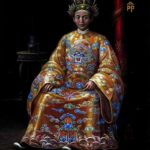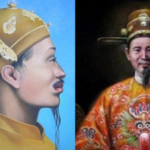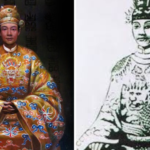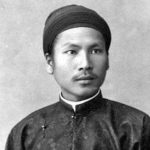For 78 years, she has been a wife, a mother, a grandmother, and an advisor to the Nguyen dynasty kings. Throughout her life, she has loved the people and devoted herself to the prosperity of the country. History books record her as the model of all ages, remembered for her dignity, compassion, and virtue. She is Queen Dowager Tu Du (or Tu Du), the wife of King Thieu Tri and the mother of King Tu Duc.
During the Nguyen Dynasty, there were a total of 13 kings, and she lived through 10 of them, from the time of King Gia Long until her passing during the reign of the 13th king, Thanh Thai.

The perfect model, helping the king govern the nation
Queen Dowager Tu Du (1810-1902) was the biological mother of King Tu Duc and the noble concubine of Emperor Thieu Tri. After her death, she was honored as the Queen Dowager and remembered by people with the title Queen Dowager Tu Du. She is renowned for her long-standing virtues.
From a young age, she showed herself to be filial, intelligent, knowledgeable in history, graceful, gentle, and beautiful. At the age of 12, her mother fell seriously ill and preferred to lie alone. Only she was able to care for her mother day and night. After her mother passed away, she mourned like an adult, earning praise from many. The mother of King Minh Mang, Queen Dowager Tran Thi Dang, heard the news and summoned her to the palace to serve Crown Prince Nguyen Phuc Mien Tong, later to become King Thieu Tri.
In 1841, King Minh Mang passed away, and King Thieu Tri ascended the throne and appointed her as his Concubine. During the Northern Journey in 1842, she always stood by King Thieu Tri, safeguarding the royal seals and precious artifacts. Besides her dignified and serious appearance, she also had a pure soul, kindness, and simplicity that endeared her to the people in the palace. She always supported and provided opinions to the king, encouraging learning and staying away from evil.

With intelligence and a good memory, she was well-versed in stories and ancient poems. This may have contributed to the success of King Tu Duc, who was famous for his literary talent.
In early 1847, when King Thieu Tri was seriously ill, she tirelessly cared for the king. Before his death, King Thieu Tri expressed regret for not having appointed her as Queen Dowager, a position she deserved for her dedication to the palace work for the past 7 years.
Tu Du Queen Dowager’s enduring fame
After King Thieu Tri’s death, Queen Dowager Tu Du lived in deep mourning, regularly going to the Royal Tomb to show her profound respect. On commemorative occasions for the king, she always wore ceremonial attire and performed the rituals seriously, demonstrating her loyalty and marital love. When her son, Hong Nham, ascended to the throne as King Tu Duc, she focused on educating and guiding him to become an enlightened and benevolent ruler.
She was strict in educating Tu Duc through reading books and explanations, emphasizing governing the country in a way that the people loved. Tu Duc later became an intelligent and gentle king.
In 1848, when Tu Duc was 19 years old, he wanted to honor his mother with the title of Queen Dowager, but initially, she refused out of respect for King Thieu Tri and to focus on national affairs. Only after two years and continuous pleas from the court, did she finally accept the ceremonial title, but requested a simple ceremony.

Queen Dowager Tu Du also valued high-ranking officials and desired to have many people like Vo Trong Binh, Pham Phu Thu, and Nguyen Tri Phuong, who worked tirelessly for the country.
Scholar Vuong Hong Sen compared Queen Dowager Tu Du to other famous queens but emphasized that she had a good reputation and no scandals. Writer Hoang Phu Ngoc Tuong also praised her compassion towards the people, such as when she requested exemption from taxes for the people when the French rebuilt Truong Tien Bridge in Hue.
To commemorate her, the Obstetrics Hospital in Ho Chi Minh City was named Tu Du, acknowledging the contributions and exemplary virtues of Queen Dowager Tu Du in Vietnamese history.



































